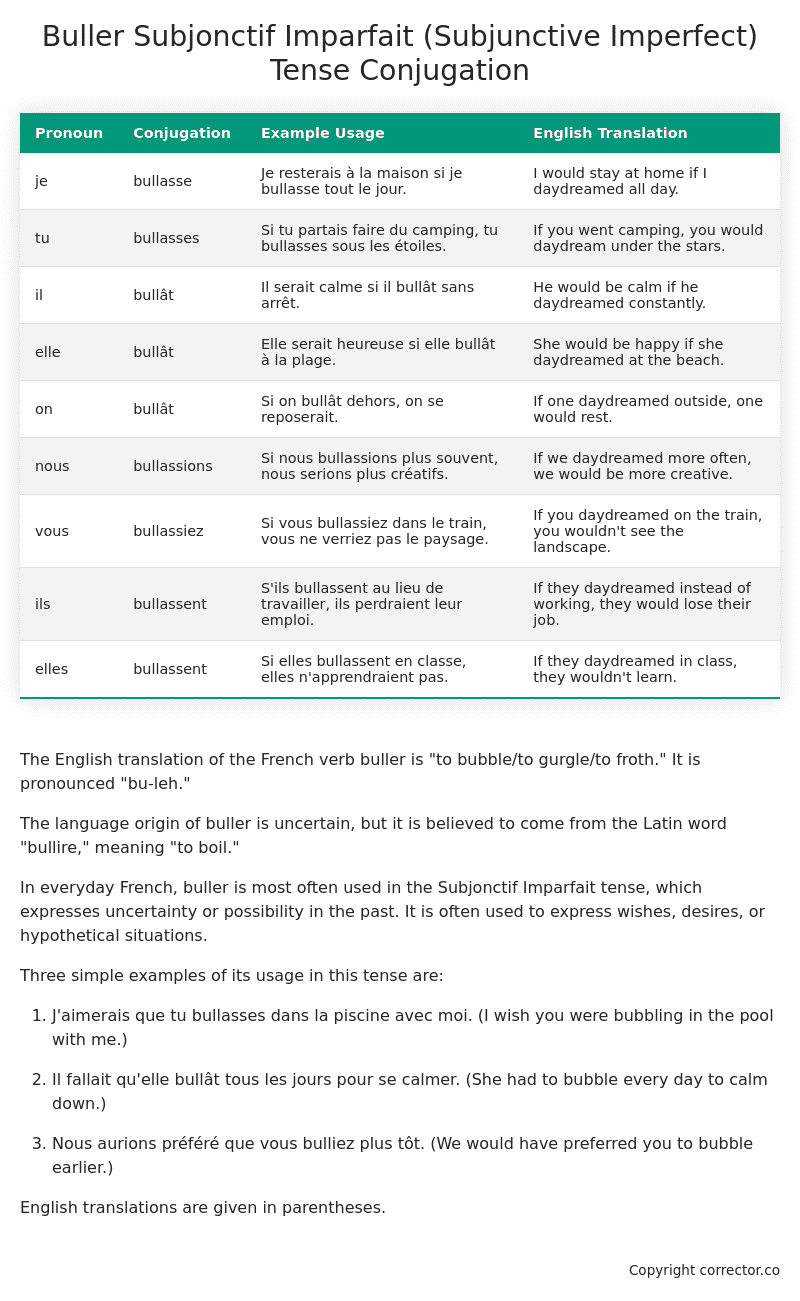Subjonctif Imparfait (Subjunctive Imperfect) Tense Conjugation of the French Verb buller
Introduction to the verb buller
The English translation of the French verb buller is “to bubble/to gurgle/to froth.” It is pronounced “bu-leh.”
The language origin of buller is uncertain, but it is believed to come from the Latin word “bullire,” meaning “to boil.”
In everyday French, buller is most often used in the Subjonctif Imparfait tense, which expresses uncertainty or possibility in the past. It is often used to express wishes, desires, or hypothetical situations.
Three simple examples of its usage in this tense are:
-
J’aimerais que tu bullasses dans la piscine avec moi. (I wish you were bubbling in the pool with me.)
-
Il fallait qu’elle bullât tous les jours pour se calmer. (She had to bubble every day to calm down.)
-
Nous aurions préféré que vous bulliez plus tôt. (We would have preferred you to bubble earlier.)
English translations are given in parentheses.
Table of the Subjonctif Imparfait (Subjunctive Imperfect) Tense Conjugation of buller
| Pronoun | Conjugation | Example Usage | English Translation |
|---|---|---|---|
| je | bullasse | Je resterais à la maison si je bullasse tout le jour. | I would stay at home if I daydreamed all day. |
| tu | bullasses | Si tu partais faire du camping, tu bullasses sous les étoiles. | If you went camping, you would daydream under the stars. |
| il | bullât | Il serait calme si il bullât sans arrêt. | He would be calm if he daydreamed constantly. |
| elle | bullât | Elle serait heureuse si elle bullât à la plage. | She would be happy if she daydreamed at the beach. |
| on | bullât | Si on bullât dehors, on se reposerait. | If one daydreamed outside, one would rest. |
| nous | bullassions | Si nous bullassions plus souvent, nous serions plus créatifs. | If we daydreamed more often, we would be more creative. |
| vous | bullassiez | Si vous bullassiez dans le train, vous ne verriez pas le paysage. | If you daydreamed on the train, you wouldn’t see the landscape. |
| ils | bullassent | S’ils bullassent au lieu de travailler, ils perdraient leur emploi. | If they daydreamed instead of working, they would lose their job. |
| elles | bullassent | Si elles bullassent en classe, elles n’apprendraient pas. | If they daydreamed in class, they wouldn’t learn. |
Other Conjugations for Buller.
Le Present (Present Tense) Conjugation of the French Verb buller
Imparfait (Imperfect) Tense Conjugation of the French Verb buller
Passé Simple (Simple Past) Tense Conjugation of the French Verb buller
Passé Composé (Present Perfect) Tense Conjugation of the French Verb buller
Futur Simple (Simple Future) Tense Conjugation of the French Verb buller
Futur Proche (Near Future) Tense Conjugation of the French Verb buller
Plus-que-parfait (Pluperfect) Tense Conjugation of the French Verb buller
Passé Antérieur (Past Anterior) Tense Conjugation of the French Verb buller
Futur Antérieur (Future Anterior) Tense Conjugation of the French Verb buller
Subjonctif Présent (Subjunctive Present) Tense Conjugation of the French Verb buller
Subjonctif Passé (Subjunctive Past) Tense Conjugation of the French Verb buller
Subjonctif Imparfait (Subjunctive Imperfect) Tense Conjugation of the French Verb buller (this article)
Subjonctif Plus-que-parfait (Subjunctive Pluperfect) Tense Conjugation of the French Verb buller
Conditionnel Présent (Conditional Present) Tense Conjugation of the French Verb buller
Conditionnel Passé (Conditional Past) Tense Conjugation of the French Verb buller
L’impératif Présent (Imperative Present) Tense Conjugation of the French Verb buller
L’infinitif Présent (Infinitive Present) Tense Conjugation of the French Verb buller
Struggling with French verbs or the language in general? Why not use our free French Grammar Checker – no registration required!
Get a FREE Download Study Sheet of this Conjugation 🔥
Simply right click the image below, click “save image” and get your free reference for the buller Subjonctif Imparfait tense conjugation!

Buller – About the French Subjonctif Imparfait (Subjunctive Imperfect) Tense
Formation
Common Everyday Usage Patterns
Interactions with Other Tenses
Subjonctif Présent
Indicatif Passé Composé
Conditional
Conditional Perfect
Summary
I hope you enjoyed this article on the verb buller. Still in a learning mood? Check out another TOTALLY random French verb conjugation!


